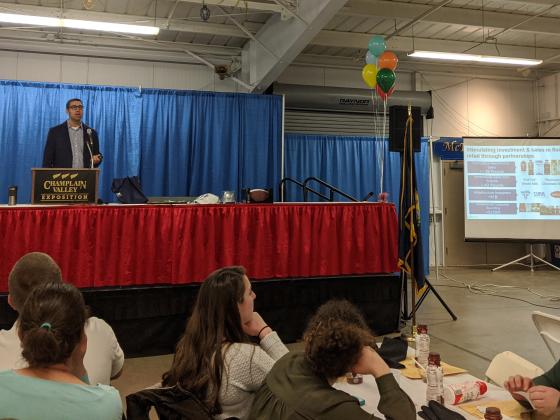Posted February 3, 2020 at 09:26am by Laura Hardie
Glass is Half Full: Half of Milk Category Showing Strong Growth

At first glance plant-based beverages seem to be taking over the dairy case and sales from milk. Yet, that isn’t the full picture said Adam Landau, Senior Vice President of Marketing Partnerships at Dairy Management, Inc (DMI).
Landau spoke with over 200 dairy farmers and industry members about fluid milk sales and innovation at the Dairy Farmer Appreciation Banquet at the Vermont Farm Show on Thursday January 23, in partnership with local dairy check-off organization, New England Dairy.
“First and foremost, I want you to know real dairy milk is still a powerhouse at retail,” Landau said. “94 percent of U.S. households buy milk – that’s 117 million homes. Or, to flip it, there are only 7 million households that don’t buy milk.”
According to market research firm IRI, plant-based beverages are a much smaller category than milk with $2 billion a year in sales, compared to milk’s annual sales of $13.8 billion. Over half of the people who buy milk do not buy plant-based beverages, and approximately 40 percent buy both milk and a plant-based beverage.
IRI data shows that the real competitor to milk is water and coffee. Fifty-three percent of white milk switching losses are from bottled water, and 11 percent is from switching to coffee. Landau said there is an opportunity to re-engage with these consumers with the beverages they want.
Landau went on to explain that about half of the milk category is showing sustained, long-term growth. In 2019, whole milk sales in New England were up 1.4 percent, representing 40 percent of white milk sales in the region.
“The data and research around the benefits of whole dairy fat continues to impact sales of whole milk. Whole milk sales are growing and now exceed sales of two-percent milk in New England and nationally,” Landau said.
Landau stressed that consumers want variety and options. Over 600 new beverages were introduced at retail in the last 5 years, and that means the beverage industry is more competitive.
Landau said flavored milk has seen long-term growth; satisfying a key consumer need around indulgence and variety. Most households that buy flavored milk buy white milk as well (over 90 percent). Lactose free milk is also a growth opportunity, with sales up 10.8 percent in 2019 in New England.
“Over a quarter of consumers self-identify as having digestive issues from lactose. In addition, U.S. consumer demographics are shifting, with population growth among consumers with higher incidences of lactose intolerance,” Landau said. “This is leading to tremendous growth in lactose-free milk; we’ve seen double-digit growth each year for the past five years, and there’s no indication of a slowdown.”
DMI is investing in research to help drive further growth in fluid milk. The research helps key industry players, including brands, retailers and processors to understand the global consumer, where growth is occurring, what beverage occasions to capture, and how to talk about milk today.
“First, we recognized that there wasn’t innovation in packaging and products to engage the consumer, and so we partnered with eight companies to stimulate investment using our research,” Landau said. “These companies to date have launched more than 1.3 billion pounds in cumulative new product sales, with fairlife® leading the way.”
Beyond retail, work also is being done to increase fluid milk sales in the foodservice industry. Landau said DMI assisted McDonald’s with the development and relaunch of the McCafé® line. Ninety percent of McCafé beverages contain dairy, and products such as lattes have more than 70 percent milk. Support from dairy checkoff food scientists also helped McDonald’s produce a reduced-sugar, low-fat chocolate milk that was unveiled nationwide in January. The new formulation has 25 percent less sugar than McDonald’s previous chocolate milk and is no longer a fat-free product.
Visit Dairy.org/Resources or NewEnglandDairy.com to learn more about national and local dairy promotion, or email info@NewEnglandDairy.com.
